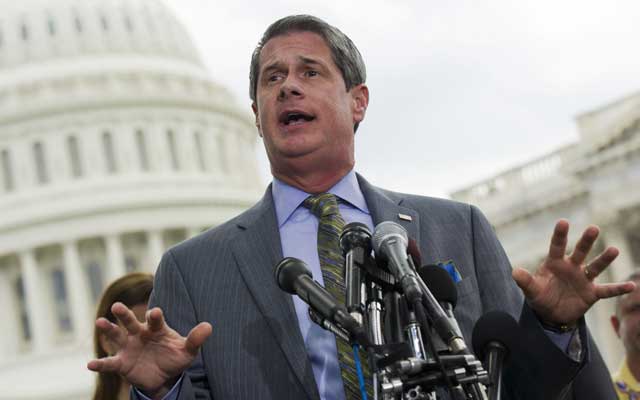Are lawmakers and their personal staffs “exempt” from Obamacare, as some conservative critics are saying?
Well, not exactly. Members of Congress and their staffs must be enrolled in the Obamacare exchange plans effective January 1, 2014. Under Section 1312 (D) of the Affordable Care Act, they can no longer get their health coverage through the Federal Employees Health Benefits Program (FEHBP), the largest group health insurance program in the world. Because they lost their FEHBP coverage, they also lost their generous FEHBP subsidy, amounting to roughly $5,000 for individual coverage, and more than $10,000 for family coverage. Just like ordinary Americans who lose their employer–based health insurance, Congress and staff would only be eligible for the exchanges’ income –related subsidies.
The Daily Signal depends on the support of readers like you. Donate now
How did this happen? During the 2010 debate on the Senate version of Obamacare, Senate Majority Leader Harry Reid inserted language that Congress and staff would henceforth have to get their insurance in the Obamacare exchanges and would thus be ineligible to purchase coverage through the FEHBP. The language was an early committee amendment authored by Sen. Tom Coburn (R-OK), who argued that Congress should not treat itself differently from other Americans.
After passing Obamacare, Congressmen soon realized they all faced higher premiums and out-of- pocket costs, just like millions of their fellow citizens. While a lower-paid staffer who makes less than $46,000 annually would qualify for the new exchange subsidies, senior staff and Members of Congress (who make $174,000 annually) would not. Just like many private-sector employers, Congressmen also worried about Obamacare’s impact on attracting and retaining employees.
Anxious about the consequences of Obamacare for themselves, Congressional leaders were nonetheless afraid to go to the House or Senate floor and vote themselves the equivalent of their previous employer-based insurance subsidy.
So, in August 2013, President Obama came to their rescue. The White House pressured the U.S Office of Personnel Management (OPM), the agency that runs the FEHBP, to give Congressmen and their staffers the same employer’s subsidy in the exchanges for next year that they would otherwise get if they had remained in the FEHBP in 2014.
This is curious. Politico reported, on Oct. 1, 2013, that OPM had concluded – before the White House intervention- that Congress could not get FEHBP subsidies for coverage in the Obamacare exchange..
In an August. 2, 2013 paper for The Heritage Foundation (Backgrounder 2831), my colleagues, including former OPM General Counsel Joseph A. Morris, published the same conclusion. The statute did not even mention OPM or grant OPM regulatory authority to implement it; nor did it provide for any additional subsidy for members of Congress and staff enrolled in the exchanges. Under the FEHBP, law, Heritage argued, OPM simply has no authority to transfer funds outside of the FEHBP program, or to make government payments to any plan other than a participating FEHBP plan.
Heritage also anticipated – correctly — that OPM might try to pull a fast one, and offer Congress administrative relief. This would spare House and Senate members a politically embarrassing floor vote to get special treatment for themselves. But OPM could only do so, Heritage warned, by ignoring the plain language of the statute.
That’s exactly what happened. Under pressure from the White House, on Aug. 7, 2013, OPM gave Congress and staffers the special taxpayer subsidies anyway. They are, in fact, “special”- since there is no Congressional authorization for the Obama Administration to provide them.
In response, Sen. David Vitter (R- LA.) is proposing an amendment that would require the president, cabinet officials and all administration political appointees, as well as Congress and staff, to enroll in the Obamacare exchanges on the same terms and conditions as millions of other Americans.
In other words, Washington’s ruling class would not get any special taxpayer subsidies. President Obama has indicated that he will veto the Vitter amendment if it gets to his desk.
Sen. Vitter’s amendment simply requires those who make and enforce the laws to live under the same rules that they impose on other Americans. President Obama, the Democratic congressional leadership and many staffers, regardless of party affiliation, and their many allies in academia and the media, strongly disagree. They think the OPM process is legal and legitimate.
That’s perfectly fine. They can argue that case in the court of public opinion. And maybe the federal courts, too.
Originally appeared in Human Events































